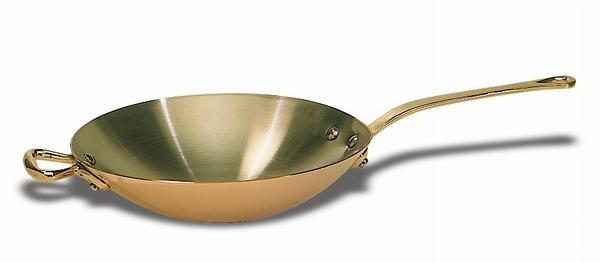Fine. If you prefer to spend $15,000 on a solid-top stove (and deal with the attendant adjustment issues), you will get very even heat. I cook most of the time on a solid top myself.
Even with modern multi-zone $$$$ solid tops, you lose adjustment flexibility, though. And none of Myrhvold's dictat addresses downward responsiveness advantages of copper over other constructions.
A comparison to a wok is extraordinarily inapt. Professional wok burners are often 5-7x the BTU output of a high-output commercial gas hob (I have one that puts out 180,000BTU; it sounds like a rocket taking off, and is very unsafe indoors unless you have a mondo fire suppression system ready). And an important aspect of wok cooking is intentionally creating unevenness in saute. There, you actually want a distinct hot spot, so choosing a poor-conductivity metal is an advantage. Witness that some of the finest woks are cast iron. Good luck making egg emulsion sauces in a thin steel or cast iron wok--on any hob.
Because even heat is a disadvantage in wok cooking, it is one of the few applications where copper is contraindicated. Falk, Bourgeat and Mauviel all make them, of course, and they will sear just as well (and just as fast) as steel on a 180KBTU wok burner. Just don't expect there to be any cooler spots to pull your food to. In this choice, $20 for better performance vs. $400 for worse (wok) performance? Buy the steel one.
Attribution: http://www.culinarycookware.com/mauviel-copper-wok.html




